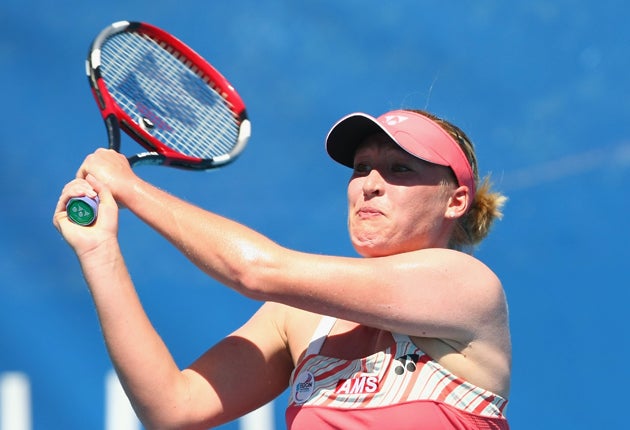Baltacha back after her toughest battle
She almost retired in 2008 due to ill health, but is now a direct entrant in Melbourne for the first time. Britain's other No 1 talks to Paul Newman

Elena Baltacha has hardly known what to do with herself here this week. The 26-year-old Scot has grown accustomed to the mental ordeal of attempting to qualify for overseas Grand Slams but when the draw was made yesterday for next week's Australian Open she knew that her place in it was already guaranteed.
Having finally broken into the world's top 100 at the end of last year, Baltacha's ranking was high enough to gain direct entry into Melbourne. She was rewarded, too, with a winnable first-round match against France's Pauline Parmentier, who at No 106 is ranked 23 places lower.
"It was lovely knowing I could just book practice courts and not have to worry about qualifying and trying to struggle through," Baltacha says. "Every year until now in the week before the Australian Open I've had to decide whether to play in Hobart or Sydney. I've always known that it would be a risk because I would also have to qualify in Melbourne."
If the rankings rewarded courage and patience as well as results, Baltacha would be higher still than her current career-best No 83. Her professional life has been dogged by injuries and health problems and she knows that for the rest of her life she will have to manage a liver condition for which she takes 10 pills every day.
"Sometimes I get really tired," she said. "I'm on medication to keep everything under control and I get monitored twice a year. The professor tells me to lead a normal life, though he always says that it's pretty unusual for someone to have this condition and still play sport at the level I'm at."
Baltacha is not one to worry about what might have been, but when you see her in full flow you wonder what more she could have achieved given a clean bill of health. She strikes the ball with impressive power, has a thunderous serve and loves the big occasion. In 2002, Baltacha reached the third round at Wimbledon at the age of 18 by knocking out the No 32 seed, Amanda Coetzer, and hitting the third-fastest serve in women's history.
A bright future was predicted for the daughter of Sergei Baltacha, a Soviet Union international footballer who joined Ipswich Town and brought his family to Britain when she was five, and Olga, an international athlete. However, almost as soon as Baltacha burst on to the scene her physical problems started with a series of injuries and, more seriously, bouts of illness. The liver condition was finally identified as the source of her difficulties, though finding ways to manage it did not stop her suffering other problems.
Having started to rebuild her career, Baltacha was forced to take 10 months off after back surgery in 2006. ''I really couldn't move properly for several months,'' she remembered. ''There was one stage where I would try to get up and I literally couldn't stand in front of the mirror and brush my teeth. I'd be leaning on the sink. Part of me was really scared. I thought: 'Will I ever come back from this? Some people never come back from surgery like that."
Once again Baltacha the battler scrapped her way back up the ladder, but she started to wonder if her ambition of reaching the world's top 100 would be beyond her. At the 2008 US Open she told her coach, Nino Severino, that she was ready to retire. ''I was probably a week away from quitting. I'd been travelling by myself, which was tough, but my coach came to New York. I told him: 'When we get back home that's it. I'm finished.' He said: 'Fine, but do me one favour. This is your last tournament, give it 100 per cent. See what you can do.'
''I got to the last round of qualifying. We got home and I thought to myself: 'Maybe there is something still there.' Nino really helped me get through it. If someone had said to me then that in a year's time I would be British No 1 and ranked in the world's top 100, I wouldn't have believed it. I was at my lowest point then.''
Under Severino's guidance and with input from Nigel Sears, the head coach of women's tennis at the Lawn Tennis Association, Baltacha has been following a training regime that puts a big emphasis on injury prevention. Her season is carefully mapped out, as is her nutritional programme.
Baltacha has a good record at the Australian Open. She came through qualifying in 2005, winning five matches before losing in the third round, and again qualified last year before losing in three sets to Amelie Mauresmo in the second round.
Baltacha has already made an impressive start in the first two weeks of the year. The high quality of the entries in Auckland and Hobart meant that she had to qualify and she was successful each time, winning three matches at both tournaments. ''Hopefully I'll have a bit more of an edge over some other players who might be going into Melbourne having lost in the first or second round of qualies both weeks,'' she said.
That positive outlook is no doubt what has helped Baltacha to keep fighting. ''I believe that obstacles are put in front of you for a reason.'' she said. ''It either makes or breaks you.''
Subscribe to Independent Premium to bookmark this article
Want to bookmark your favourite articles and stories to read or reference later? Start your Independent Premium subscription today.

Join our commenting forum
Join thought-provoking conversations, follow other Independent readers and see their replies